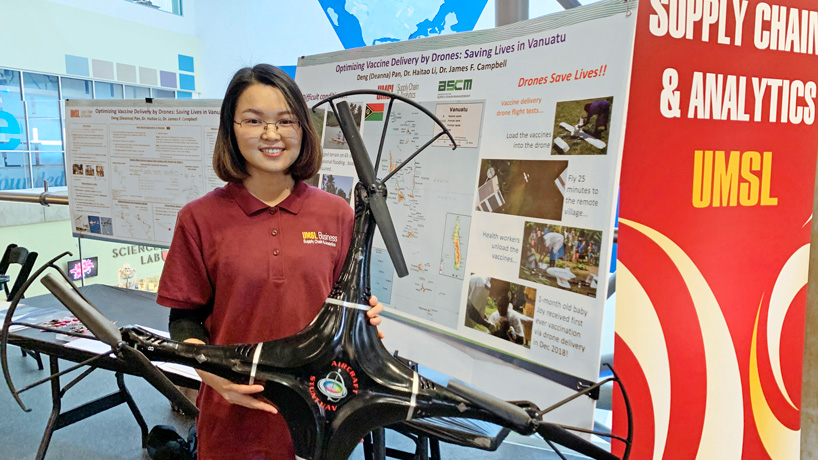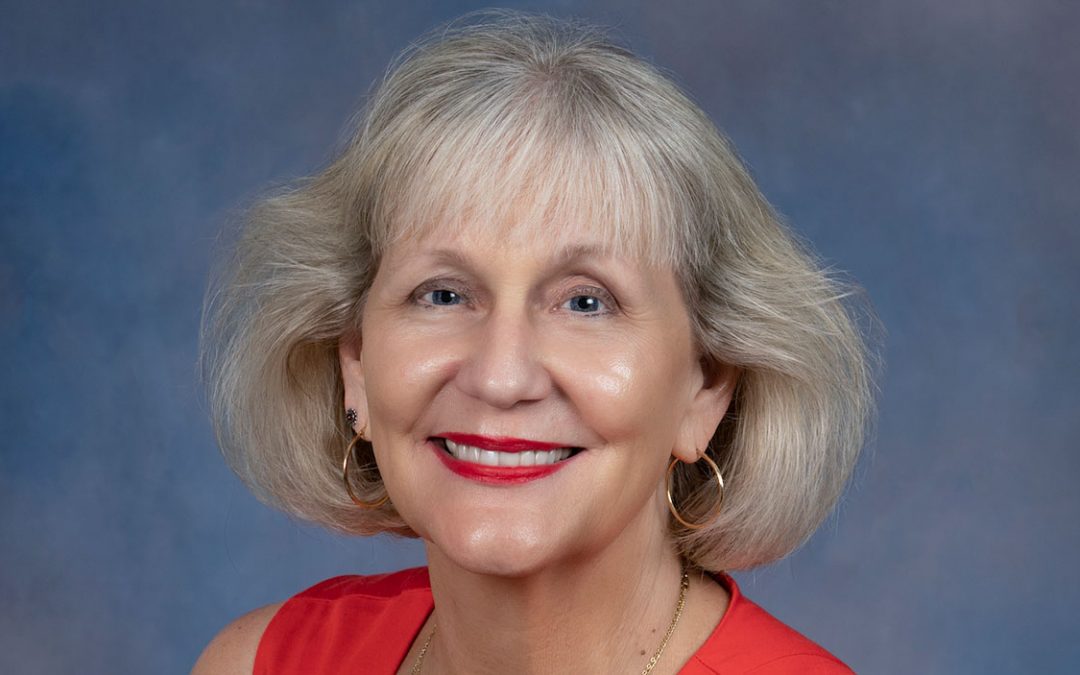
Supply chain PhD candidate Juan Zhang’s dissertation explores the cost and environmental tradeoffs of using drones to deliver packages. (Photo courtesy of Juan Zhang)
The COVID-19 pandemic has made people take notice of the importance of building and maintaining strong supply chains, whether to keep in-demand products stocked on the shelves at the local supermarket or delivering potentially life-saving shots to millions of people.
University of Missouri–St. Louis supply chain and analytics PhD student Juan Zhang is researching ways to make delivering goods more efficient and effective.
She has already helped Express Scripts and Ameren analyze data to create systems that will deliver products and services in the most efficient way. Zhang said the supply chain and analytics program in UMSL’s College of Business Administration enables her to apply the knowledge she’s gained to offer tangible solutions to real-world problems.
“Many schools do theoretical work,” she said. “We have the theoretic foundations and apply it to what’s going on in the real world. It involves really understanding what the problem is and talking to people in business. We use our expertise to solve those problems.”
Zhang said doing things like helping Ameren turn their customers’ lights on is a lot more involved than most people think. She uses online ordering as an example.
“When you open a website and you order at Walgreens and you just click to submit the order, you really don’t know what happens at the back end,” Zhang explains. “We can help with the algorithm, how to fulfill the order, how to deliver the order to you. A supply chain person does all those things.”
James Campbell is professor of supply chain analytics and advisor to Zhang. He said UMSL has developed a strong analytics and supply chain program to support the industry demand for supply chain talent, from bachelor’s degrees to PhDs”.
“Supply chains are really important,” he said. “Now everybody knows about supply chains because of COVID, like with the toilet paper shortage but also with the vaccines. How do you get the vaccine from the factory and into your arm? That’s a huge supply chain problem.”
Zhang’s PhD dissertation focuses on the cost and environmental tradeoffs of using drones to deliver packages. The research explores how to model the energy consumption of drones, which is important to estimating the cost savings and environmental friendliness of drone delivery.
Zhang’s research looks at three types of delivery: truck only, drone only and a hybrid of truck and drone that launches drones from the truck to deliver packages. In the hybrid model, a truck carries drones on top, and both the drone and the driver can deliver packages in parallel.
Zhang’s research results show that drone technology has the potential to save money, reduce energy consumption, reduce greenhouse emissions and even alleviate road congestion by replacing trucks with drones.
“This is really exciting research,” she said. “It’s important not only in universities, but also in companies all over the world like Google and Amazon. They are all excited because they have this vision to use it.”
In addition to the important environmental benefits of Zhang’s research, Campbell said companies like Amazon would benefit from potentially billions in savings from using drones instead of trucks for package delivery.
“Last year Amazon spent $21 billion on shipping costs just in one quarter of one year,” he said. “So, you can see why Amazon is interested.”
Zhang’s research also caught the interest of theUniversity of Wisconsin-Eau Claire, which just awarded her a tenure-track position teaching supply chain management, logistics and analytics classes and helping to create new programs in supply chain management.
“It’s a great opportunity for me because I really love supply chain management,” Zhang said. “I have the opportunity to teach but also to learn with my students. And I get paid to do the things that I like. I really look forward to starting in Wisconsin!”
Zhang added: “I feel lucky. It’s all because of the encouragement that I got from Dr. Campbell and others in my department. They encouraged me to try and push harder.”
Campbell recruited Zhang from China, where she had earned her bachelor’s degree in logistics management from the Huazhong University of Science and Technology in 2015. Zhang is originally from Jingzhou, a city in the province of Hubei.
Zhang discovered the supply chain PhD program at UMSL from online research. She emailed Campbell about the program, and he replied “immediately.” She was initially concerned because she did not have a master’s degree and was in need of financial support.
“I told him if I could not have a scholarship, my family could not afford for me to come to the United States,” said Zhang, whose parents are furniture makers. “I really wanted to come and be part of UMSL and do the research. And Dr. Campbell saw my resume, and they gave me a full scholarship.”
Campbell saw Zhang as a “very capable” student with a “bright future.”
“The faculty try to recruit the best students from around the world,” he said. “I think that she’s an example. She didn’t come from Illinois, she came from China. We try to give them the tools to succeed, and I think she’s a great example of this.
“Someone like her, with a different background and who doesn’t know anybody in St. Louis – that takes a lot of courage to come here to study. And now she’s going to be educating the next generation.”














